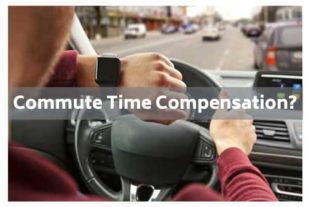 Commute time compensation? Most people who work spend a fair amount of time commuting to the job site. Furthermore, many jobs require workers to commute as part of the job. With such variety in the expectations and commuting requirements for various occupations, how can you know whether or not your employer is treating you fairly when it comes to commute time? Actually, the courts have come up with some pretty clear guidelines on this topic.
Commute time compensation? Most people who work spend a fair amount of time commuting to the job site. Furthermore, many jobs require workers to commute as part of the job. With such variety in the expectations and commuting requirements for various occupations, how can you know whether or not your employer is treating you fairly when it comes to commute time? Actually, the courts have come up with some pretty clear guidelines on this topic.
Commuting in a Company Vehicle
Installation and repair crews for Pacific Bell Telephone Company believed they should be paid for their commute time to and from home because they were driving vehicles that were provided by Pacific Bell, and those vehicles were equipped with the tools and equipment necessary to address customer needs. They decided to pursue the issue in court.
Details of the Commute Time Case
Technicians were paid hourly for an eight-hour day to address customer issues at customer’s homes. While driving the prescribed vehicle and using company tools was required, employees had a couple of choices when it came to those vehicles:
- Technicians could take the company vehicle to and from their own homes. This option was known as the Home Dispatch Program (HDP). Technicians received no pay for their commute time driving to a customer’s home prior to 8:00, and they were not compensated for the time spent driving home after their last appointment.
- Employees could drive their personal vehicles to the Pacific Bell garage to exchange it for a Pacific Bell vehicle. These employees were paid for their time spent going to the garage in the morning, and from the garage home at the end of a shift.
In either case, employees were compensated for the commute time driving to and from the warehouse when they needed to restock materials for the job.
Court Findings
The California Supreme Court defined hours worked as those hours during which an employer maintains control of an employee. The issue of employer control was central to their findings, and was directly correlated to whether or not riding in employee-provided transportation was required. The court referred to Morillion v Royal Packing Co., which dealt with a similar issue. In that case, workers were required to meet at a particular place in order to take the company bus to the worksite. Employees were under the control of their employers at that point because they could not make the decision to stop at a drive-through window for coffee, could not pick up or drop off kids on the way, and could not run other errands while on the bus. Therefore, the commute time on the bus counted as hours worked.
In the case of the Pacific Bell Workers, employees were not required to drive a company vehicle to and from home. Additionally, they were free to make stops during their commute time in the company vehicle, meaning the worker was not under the control of the company. Therefore the commute time spent under the HDP plan was not compensable.
Labor Questions
If you work in Sonoma County, Mendocino County, or Lake County California and have concerns about commute time law or other workplace issues and are considering a lawsuit against your employer, the experienced employment law team at Beck Law P.C. can help. Contact us in Santa Rosa today for a confidential consultation.
